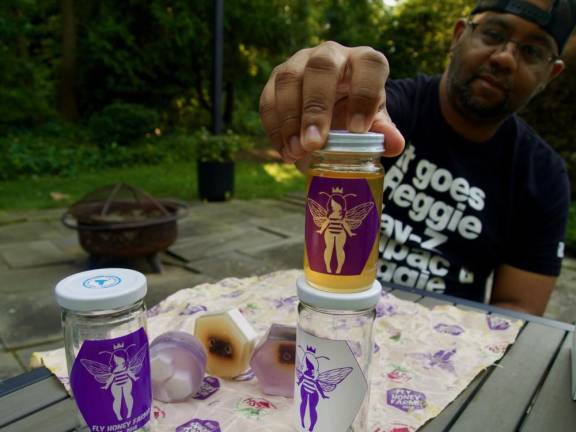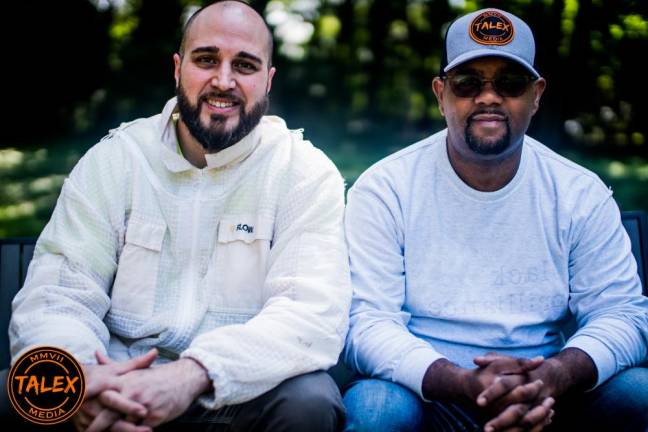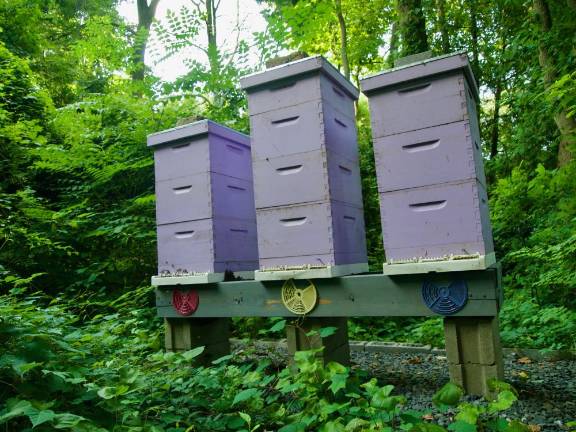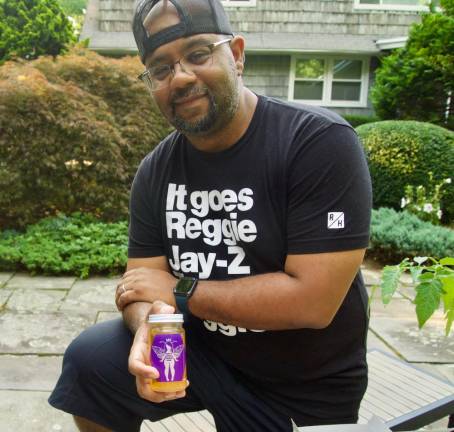The honey hustle
How a four-year-old’s vision, purple and sweet, came true




Scene: 1980s, an elementary school in Tarrytown, NY. In anticipation of parent-teacher day, a young James Pratt tells his teacher, “My dad is a beekeeper.” The proclamation, which couldn’t have been further from the truth, became a running joke among Pratt’s crew of friends anytime a jar of honey was around – until 2016, when Pratt decided to indulge his childhood imaginings and, yes, become a beekeeper himself. Mix in Pratt’s childhood friend, self-declared hustler Carlo Esannason, and a good dose of brotherly love, and you have Fly Honey Farms.
The Westchester- and Rockland-based honey farm is part of a growing trend of small-scale businesses to invest back into the people and places that matter to them. Yields from their purple-packaged honey and “swag” – honeycomb soaps, tees, and even beeswax wrap – find their way to the community in all sorts of ways, like discounts for customers who pay with SNAP tokens and hive installations at local schools, where students can learn firsthand about beekeeping. The community returns the love, with friends and community members volunteering to host hives on their properties, a set-up known in beekeeping as “out apiaries.”
“We collab with people because we think honey goes well with a lot of things,” said Esannason. They have teamed up on projects from classic holiday bundles with local teas to more artistic pairings like bee wing acrylic jewelry and handmade bee paper. Creativity abounds within the abundance of the hive.
A hazy Saturday afternoon in late summer found me at one of Fly Honey Farm’s out apiaries, tucked into the hills near Tarrytown, NY. “What’s the story behind all the purple?” I ask. “The hives are purple, it’s in your logo... even your kicks are purple!”
So Esannason, wearing a T-shirt bedecked in Eminem lyrics, goes back to the beginning. The origin story unfolds at a barbeque at the house: Pratt was talking about his work with the bees, wishing he had more space to grow the hives. Then, “in typical Pratt fashion, as you would expect your best friend to do, right, like he turns around and looks at my daughter who was four at the time... he goes, ‘You want bees?’ And she’s like, ‘Yes! I want purple hives!’
“I was like, ‘Dude! You can’t do that to a four-year-old!’”
The idea was pulled out of thin air – but it landed with a good omen. It happened that Esannason’s daughter had picked the color associated with one of Hip Hop’s greatest albums: Raekwon’s Only Built 4 Cuban Linx, known by fans as “Purple Tape” because of the limited-run purple-tinted cassette. “It was a sign from the bee gods that this was supposed to happen,” said Esannason.
“My previous experience with honey,” said Esannason, “had been from a little squeezy bear in the supermarket, which we all know now is not real honey.” The first time he tasted the honey from his own hives, his mind, as he says, was blown. And then hustler mode set in. “Dude. We can do some really good stuff with this honey!”
Fly Honey Farms generally does one harvest per year, usually in late July, so that the bees have time to stock up with honey by the fall to make it through winter. “We are a bee company first. Because we can sell honey, we can take care of our bees to be happy, healthy and well protected,” explains Esannason. Keeping hives alive year-round is an increasingly difficult endeavor in the age of colony collapse disorder. Last year, the average beekeeper lost 45.5 percent of their bees, according to preliminary data from an annual survey by the Bee Informed Partnership. It was the second worst year on record. “Our record in terms of hive loss is 5 to 10 percent, so we’re doing the right thing,” said Esannason.
At around 25 hives in total, they’ve doubled in size every year thus far, though commercial scale is not the goal right now. The first year, 2018, was all word-of-mouth, guerilla tactics. Then in 2020, Fly Honey Farms became the only vendor approved to provide honey to New York State Schools. How did a small start-up achieve such a distinction? Equal parts unrelenting curiosity, holding themselves to the highest of standards, and that “why not us?” swagger. Upon discovering that there were actually no approved honey vendors listed for NY State and realizing that NY State provides a reimbursement to schools who buy locally, the choice was obvious. Esannason’s daughter’s school now provides smoothies made with Fly Honey Farms’ honey as a breakfast option. Sweet.